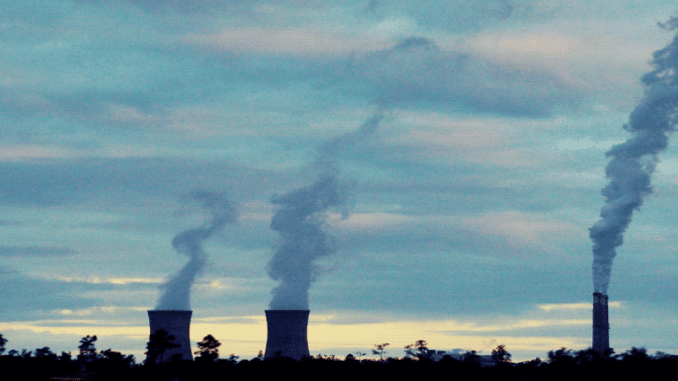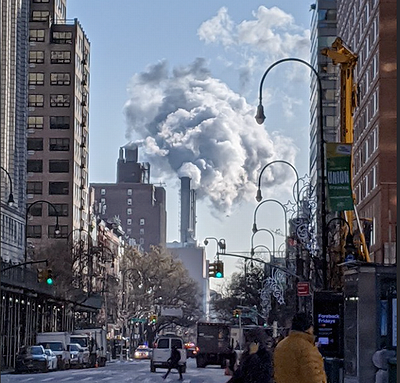
WASHINGTON, DC, June 30, 2022 (ENS) – A majority of U.S. Supreme Court Justices voted today to restrict the Environmental Protection Agency’s ability to limit and reduce carbon dioxide emissions that raise the atmospheric temperature, accelerating the climate crisis.
The case, West Virginia v. EPA, was brought by states and coal companies who argued that the Clean Air Act does not properly give the EPA authority to regulate greenhouse gases, and that the authority to do so rests with Congress.
In the majority opinion written by Chief Justice John Roberts, the Supreme Court ruled in favor of West Virginia’s position that Congress must more clearly spell out the power of the EPA to regulate carbon dioxide emissions under the Obama-era Clean Power Plan.
In 2015, the EPA issued the Clean Power Plan rule, which addressed carbon dioxide emissions from existing coal- and natural-gas-fired power plants. But the U.S. Supreme Court stayed the Clean Power Plan in 2016, preventing the rule from taking effect; the EPA stated its intention not to enforce the Clean Power Plan and to instead engage in new rulemaking, and it was later repealed after President Donald Trump took power.
In today’s opinion, the majority of justices took issue with the way the EPA would have determined the emissions limit with which regulated entities, such as power plants, would have had to comply. The agency derives that limit by determining the “best system of emission reduction” or BSER. In this case the Clean Power Plan identified the best system as “generation shifting” at the grid level – a shift in electricity generation from higher-emitting to lower-emitting producers.
Chief Justice Roberts wrote, “The Government projected that the rule would impose billions in compliance costs, raise retail electricity prices, require the retirement of dozens of coal plants, and eliminate tens of thousands of jobs.”
The majority of justices held that, “Congress did not grant EPA in Section 111(d) of the Clean Air Act the authority to devise emissions caps based on the generation shifting approach the Agency took in the Clean Power Plan.”
“The issue here is whether restructuring the Nation’s overall mix of electricity generation, to transition from 38% to 27% coal by 2030, can be the BSER within the meaning of Section 111,” wrote Chief Justice Roberts for the majority.
The three dissenting justices warned, “Today, the Court strips the Environmental Protection Agency (EPA) of the power Congress gave it to respond to the most pressing environmental challenge of our time. The Court appoints itself – instead of Congress or the expert agency – the decisionmaker on climate policy. I cannot think of many things more frightening.”
Biden Pledges Swift Action
President Joe Biden called the Supreme Court’s ruling “another devastating decision that aims to take our country backwards,” and he pledged to continue to fight climate change.
“I will take action. My administration will continue using lawful executive authority, including the EPA’s legally-upheld authorities, to keep our air clean, protect public health, and tackle the climate crisis,” President Biden said. “We will work with states and cities to pass and uphold laws that protect their citizens. And we will keep pushing for additional Congressional action, so that Americans can fully seize the economic opportunities, cost-saving benefits, and security of a clean energy future. Together, we will tackle environmental injustice, create good-paying jobs, and lower costs for families building the clean energy economy.”
“We cannot and will not ignore the danger to public health and existential threat the climate crisis poses. The science confirms what we all see with our own eyes – the wildfires, droughts, extreme heat, and intense storms are endangering our lives and livelihoods,” he said.
“While this decision risks damaging our nation’s ability to keep our air clean and combat climate change, I will not relent in using my lawful authorities to protect public health and tackle the climate crisis,” President Biden said.

“Since the Clean Air Act was passed by a bipartisan majority in Congress in 1970, this law has enabled both Democratic and Republican administrations to protect and improve the air we breathe, cutting air pollution by 78 percent even as our economy quadrupled in size. Yet today’s decision sides with special interests that have waged a long-term campaign to strip away our right to breathe clean air,” Biden said.
The case brought by the state of West Virginia was consolidated with three other cases brought against the EPA by:
- – Westmoreland Mining Holdings, a Delaware company. It also owns Prairie Mines & Royalty ULC, which is incorporated in Alberta, Canada and owns and operates coal mines in Alberta, where Westmoreland has brought a similar case against the Government of Canada.
- – North American Coal Corp., the largest lignite coal producer in the United States and ranked among the top 10 of all coal producers globally,
The third consolidated case was brought by the state of North Dakota, a coal-producing state. State Attorney General Attorney General Drew Wrigley said, “Today North Dakota secured a landmark U.S. Supreme Court victory in one of the most important environmental and energy law cases in decades, firmly establishing the States’ role as an equal partner with the Federal government in regulating greenhouse gas emissions from power plants. This is a tremendous victory for North Dakota and for every State.”
Decision Prompts More Clean Energy and Climate Protection
EPA Administrator Michael Regan said, “While I am deeply disappointed by the Supreme Court’s decision, we are committed to using the full scope of EPA’s authorities to protect communities and reduce the pollution that is driving climate change. We will move forward to provide certainty and transparency for the energy sector, which will support the industry’s ongoing efforts to grow our clean energy economy.”
At this moment, when the impacts of the climate crisis are becoming ever more disruptive, costing billions of dollars every year from floods, wildfires, droughts and sea level rise, and jeopardizing the safety of millions of Americans, the Court’s ruling is disheartening,” Regan said.
“Ambitious climate action presents a singular opportunity to ensure U.S. global competitiveness, create jobs, lower costs for families, and protect people’s health and wellbeing, especially those who’ve long suffered the burden of inaction. EPA will move forward with lawfully setting and implementing environmental standards that meet our obligation to protect all people and all communities from environmental harm,” the EPA administrator said.
U.S. Senator from Massachusetts Ed Markey has been a supporter of clean energy for decades. In January 2021, Senator Markey joined nearly 200 colleagues from the House and Senate in submitting an amicus brief to the Supreme Court in West Virginia v. EPA in support of the EPA’s position.
“Today’s ruling lets polluters turn back the clock on 50 years of reduced pollution and improved air quality all across the country,” Senator Markey said today. “The result of this dangerous decision is an EPA that is undermined in its ability to protect the public from harmful pollution and greenhouse gas emissions. We cannot sit by as a captured, illegitimate, and far-right Supreme Court majority eviscerates the authorities that the government has had for decades to address greenhouse gas pollution from fossil fuels and prevent climate chaos.”
“We must expand the Court to restore balance to the bench, and we must pass the climate justice and clean energy package that will enable our urgent efforts to address the climate crisis,” Markey said.
In April 2021, Senator Markey, together with House Judiciary Committee Chairman Jerrold Nadler of New York, Representative Mondaire Jones of New York, and Chairman of the Judiciary Subcommittee on Courts, Intellectual Property, and the Internet Hank Johnson of Georgia, introduced a bill to expand the Supreme Court by adding four seats, creating a 13-justice Supreme Court. The legislation is endorsed by the League of Conservation Voters.
And in addition, Senator Markey is urging his colleagues to pass stronger legislation governing greenhouse gas emissions. “Congress must not only support the EPA’s longstanding, life-saving efforts to protect climate and public health in the face of this decision, but Congress must also do its job and pass meaningful climate and clean energy funding to protect our communities and our future,” Markey urged.
Environmental groups warned of dire climate consequences.
“Today’s Supreme Court ruling undermines EPA’s authority to protect people from smokestack climate pollution at a time when all evidence shows we must take action with great urgency,” said Vickie Patton, General Counsel for the nonprofit Environmental Defense Fund, which was a party to the case.
“This is judicial overreach. Today’s ruling was made even though there are no national pollution standards in effect right now for existing power plants. Yet the Court still reached out to rule on an abstract question – and weakened EPA’s authority,” Patton said.
“Climate disasters are growing more frequent, more deadly, and more costly every year,” said Patton. “We have clean solutions that will help protect people from the damages of climate change while also creating economic opportunities and jobs. Today’s Supreme Court ruling should be a clarion call for President Biden, EPA Administrator Regan, and Members of Congress that we need swift action to address the climate crisis. We need Americans to register to vote and demand climate leadership. All of us must do more to protect people from the clear and present danger of climate change.”
EDF is part of a coalition of health and environmental groups that defended EPA’s authority and responsibility to address climate pollution from power plants.
Two dozen states and cities, businesses, and numerous power companies that serve millions of customers in states across the country – and would be the regulated parties if any standards were in effect – also supported EPA’s authority in the case. All the briefs filed in the case can be read here.
In response to the ruling, the American Lung Association and American Public Health Association issued a joint statement, saying, “Climate change is a health emergency and fossil fuel-fired power plants are driving climate change. Power plants pollute the air we breathe, emit toxics including mercury, arsenic and dioxin and cause health harms nationwide.”
“The Clean Air Act gives EPA the authority and responsibility of addressing air pollution that threatens public health and welfare,. This includes the obligation to regulate the greenhouse gases from power plants and other sources that drive climate change,” the two organizations said.
The two groups called on the EPA “to quickly write a new rule that maximizes emissions reductions. The nation cannot afford further delays to address the climate crisis.”
“We also call on EPA to move forward with the urgent set of regulations under consideration that are not affected by today’s decision. EPA has clear authority to finalize much-needed updates to national air pollution standards and limits on polluting sources, including limits on emissions from the power sector.”
“We reiterate our call on Congress to immediately pass much-needed climate investments. Spurring a nationwide transition to clean, non-combustion electricity, zero-emission vehicles and environmental justice is more critical than ever,” urged the American Lung Association and American Public Health Association.
“Despite today’s decision, the urgency of climate action is greater than ever, as are the immediate health harms to people nationwide,” they said “Our organizations and the broader health community stand committed to supporting strong policies to address the climate crisis at the federal, state and local levels.”
Featured image: The coal-fired Stanton Power Plant, January 10, 2017, Orlando Florida (Photo by Rusty Clark ~ 100K Photos)



